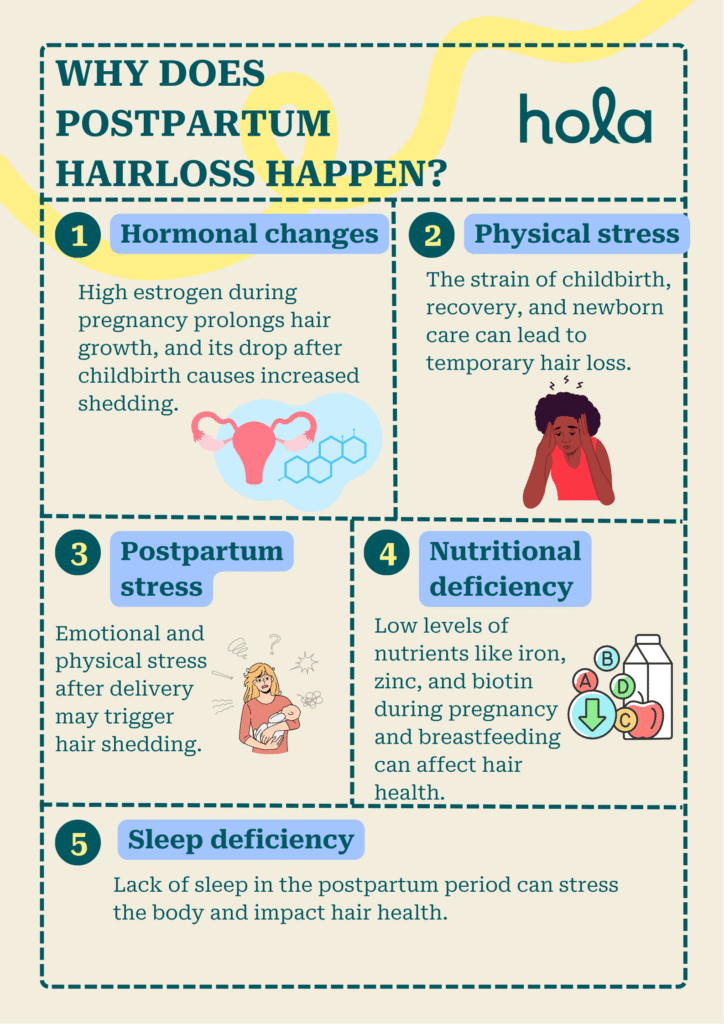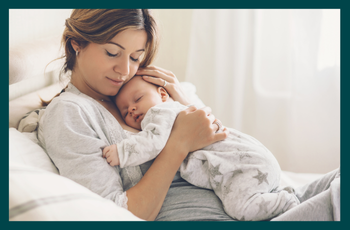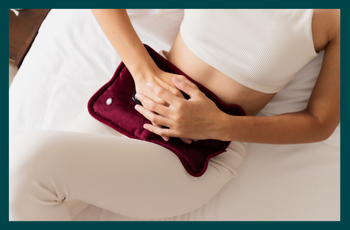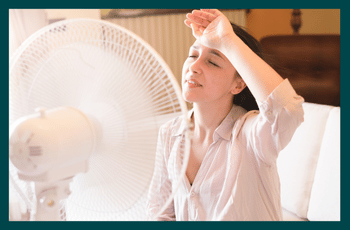Postpartum hair loss: What to expect
Written by the editorial staff writer at Hola. Medically Reviewed by Dr. Ammar AL-ANI, MBChB, CCBST, AMC.

Contents

Introduction
Postpartum hair loss is a prevalent and often distressing experience for many new mothers, with over 90% of women experiencing some form of hair loss after childbirth. While pregnancy brings various changes to a woman’s body, one of the most visible changes after childbirth is hair loss. Understanding what postpartum hair loss is, why it happens, and how long it lasts can help new mothers cope with this temporary phase and ease concerns about their appearance.What is postpartum hair loss?
Postpartum hair thinning or hair loss, also known as telogen effluvium, is a common issue after childbirth, where women experience significant hair shedding. During pregnancy, high hormone levels keep hair in the growth phase, leading to thicker hair. After delivery, hormone levels drop, causing more hair to enter the resting phase and shed. This typically begins a few months after giving birth and may last for several months. While it can be distressing, postpartum hair loss is usually temporary, and hair growth often resumes within 6 to 12 months.What are the signs of postpartum hair loss?
The signs of postpartum hair loss include:- Increased shedding
- Thinning hair
- Seeing clumps of hair on pillows or the bathroom floor
Feeling sick and unsure why? Speak with a GP online in 15 minutes.
Why does it happen?
Hormonal changes after childbirth primarily cause postpartum hair loss. The main factors contributing to this include:- Hormonal changes: During pregnancy, high estrogen levels extend the hair growth phase, leading to thicker hair. After childbirth, estrogen levels decrease, causing more hair to enter the resting phase, resulting in increased shedding.
- Physical stress: The physical challenges of childbirth, recovery, and caring for the newborn can put pressure on the body, which may lead to hair loss.
- Postpartum stress: The emotional and physical stress of adapting to life with a newborn can contribute to hair shedding.
- Nutritional deficiencies: Pregnancy and breastfeeding can drain key nutrients, including iron, zinc, and biotin, which support hair health, possibly contributing to hair thinning.
- Sleep deficiency: Sleep deprivation during the postpartum period can stress the body, possibly influencing hair health.

When does it happen?
Postpartum hair loss usually begins around 2 to 4 months after giving birth. This is when the hormonal fluctuations from pregnancy begin to stabilise, resulting in the shedding of hair that was retained during pregnancy. The shedding tends to peak around 4 to 6 months after birth and may last several months before hair growth returns to normal.How long does postpartum hair loss last?
Postpartum hair loss generally lasts for about 6 to 12 months after delivery. The shedding typically peaks between 4 to 6 months, and slowly decreases. Most women will notice their hair returning to normal within a year, though the duration can differ.What to expect?
Postpartum hair loss is a frequent and temporary issue that typically starts around 2 to 4 months after giving birth. This occurs due to changes in hormones, particularly the decrease in oestrogen, which leads to more hair falling out than normal. You might observe more hair loss while brushing or washing. This shedding usually reaches its highest point between 4 to 6 months postpartum and gradually decreases. By 6 to 12 months, hair growth generally resumes its normal state. While it can be concerning, postpartum hair loss is a natural aspect of the recovery process. Eating a balanced diet, following a gentle hair care routine, and managing stress can aid in the regrowth of hair.Is it serious?
No, postpartum hair loss is not a serious concern and is an ordinary, temporary occurrence resulting from hormonal changes after giving birth. It generally starts around 2 to 4 months postpartum, peaks at 4 to 6 months, and resolves by 6 to 12 months as hair regrowth stabilises. Nonetheless, if the hair loss is significant, continues for more than a year, or comes with other symptoms such as fatigue or brittle nails, it may suggest an underlying issue like thyroid problems or nutrient shortfalls. In such situations, seeking advice from a doctor can help determine any potential concerns and suggest appropriate treatment.What are the treatment options?
Postpartum hair loss is a common and temporary stage brought on by hormonal fluctuations following childbirth. Although it can be unsettling, there are methods to encourage healthy hair regrowth.- Nutrient-dense diet: Consuming foods rich in iron, biotin, and protein can help strengthen hair.
- Continuing vitamins: Taking supplements that include biotin, vitamin D, and zinc may be beneficial.
- Gentle hair care: Minimising heat exposure, avoiding harsh brushing, and avoiding tight hairstyles can help prevent breakage.
- Scalp massage and essential oils: Massaging the scalp with rosemary or castor oil may enhance blood flow
- Medical advice: If hair loss persists beyond a year, it’s wise to consult a doctor to exclude any deficiencies or thyroid problems.
Also read: Postpartum hair loss: Tips from GP
Does magnesium help with postpartum hair loss?
Magnesium plays an important role in hair growth and overall well-being, but its direct influence on postpartum hair loss is limited. It assists in regulating hormones, lessening stress, and enhancing nutrient absorption, all of which can contribute to healthier hair. Additionally, magnesium promotes protein synthesis, essential for robust hair follicles. Although postpartum hair loss primarily stems from hormonal changes, a magnesium deficiency may lead to weaker hair, delayed regrowth, and heightened shedding. Including magnesium-rich foods like leafy vegetables, nuts, seeds, and whole grains, or taking a supplement as advised by a healthcare professional, may help in maintaining healthy hair.
While magnesium on its own won't prevent postpartum hair loss, it can support overall scalp health and hair strength when combined with a nutritious diet and a proper hair care regimen.
What deficiency causes hair loss postpartum?
Postpartum hair loss mainly arises from hormonal shifts, though specific nutrient deficiencies can exacerbate hair shedding and hinder regrowth.- Iron deficiency: Low iron levels can contribute to increased hair thinning, as iron is essential for transporting oxygen to hair follicles. Women who experience substantial blood loss during childbirth are more susceptible.
- Biotin deficiency: Biotin (vitamin B7) is crucial for hair strength and growth. A deficiency in it can lead to brittle, weak hair that breaks easily.
- Vitamin D deficiency: Insufficient levels of vitamin D can disrupt the hair growth cycle, resulting in excessive shedding. Sun exposure and supplements can assist.
- Zinc deficiency: Zinc is essential for the repair and growth of hair tissue. A deficiency can weaken hair strands and impede regrowth.
- Magnesium deficiency: Magnesium aids in regulating stress and protein synthesis, vital for maintaining healthy hair. Low levels may lead to increased shedding.
Also read: Which vitamin deficiency causes hair loss?
Will my hair grow back after postpartum hair loss?
Indeed, hair loss after childbirth is a temporary issue, and your hair will eventually grow back on its own. Most women experience increased shedding between 2 to 4 months after giving birth, with hair regrowth usually starting around the 6-month mark. By 12 months post-delivery, most women find that their hair returns to its regular growth pattern. Although you cannot entirely prevent the shedding, adhering to a diet rich in nutrients, employing a gentle hair care routine, and managing stress levels can aid in healthy regrowth. If the hair thinning continues beyond a year or if you see thinning in other areas, it's advisable to consult a healthcare professional to rule out any underlying deficiencies or hormonal issues.
When to call the doctor?
It’s normal for hair loss after childbirth to be temporary, but in some instances, it might warrant medical attention. If the hair loss is extreme, patchy, or persists for longer than 12 months, it could indicate an underlying problem such as thyroid dysfunction, iron deficiency, or hormonal disorders. Other concerning signs include thinning of eyebrows, fragile nails, severe fatigue, or unexplained weight fluctuations. If the shedding is significant enough to cause visible thinning of the scalp or bald patches, a doctor can evaluate potential deficiencies and suggest treatments that may include blood tests, supplements, or topical remedies. Seeking medical guidance is crucial for a proper diagnosis and treatment for long-term hair health.
Where can I get medical advice?
You can seek medical guidance for postpartum hair loss and other health issues from several trustworthy sources.
- Primary care doctors: Your general practitioner can evaluate hair loss, conduct tests for deficiencies, and propose treatment methods.
- Dermatologists or trichologists: Experts in skin and hair health can diagnose scalp issues and recommend targeted therapies.
- Telehealth platforms: Online services such as Hola Health offer telehealth appointments with minimal wait times.
- OB/GYNs or endocrinologists: If hair loss is related to hormonal irregularities, thyroid problems, or recovery after childbirth, these specialists can assist.
- Pharmacies and health clinics: Many provide walk-in consultations or guidance on hair-nurturing supplements.
Consulting healthcare professionals ensures accurate diagnosis and management of postpartum hair loss. Whether through a doctor, specialist, or telehealth platform, early action can help restore hair health. Let us know if you need help finding the appropriate provider.
Postpartum hair loss is temporary, and while it can be frustrating, it usually resolves within 6 to 12 months. With proper care, patience, and time, your hair will resume its normal growth cycle. Remember, this phase is just one part of the postpartum journey, and it will eventually pass.
What we treat
- Cough
- Nausea & vomiting
- Fever
- Hayfever
- Fatigue
- Sore throat
- Acne
- Hair loss
- Gout
- Eczema
- Rosacea
- Sunburn
- UTI
- Erectile dysfunction
- Contraception
- Morning sickness
- Morning after pill
- Prostate health
- Anxiety
- Depression
- Stress
- Grief & loss
- Antidepressants
- Premature ejaculation
- Asthma
- Blood pressure
- Blood thinners
- Diabetes
- Cholesterol
- Migraines & headaches
- Allergies
- Body ache
- Heartburn & reflux
- Sleep disorder
- Pain relief
- Gastro
Related Articles
Disclaimer
This blog is for general informational purposes only and does not indicate that Hola Health provides all treatments or preventive measures mentioned. It is not intended to be a substitute for professional medical advice. Always seek the guidance of your doctor or other qualified health professional with any questions you may have regarding your health or a medical condition. For emergencies please immediately contact 000. Any medical topics discussed are intended to educate, not to imply availability through Hola Health.

Get affordable healthcare on your terms, with quick access to qualified, Australian-registered telehealth doctors & health practitioners, 24/7, 365 days a year. No more searching for ‘doctors near me‘ – Hola connects you instantly.
Address: 79 St Georges Terrace, Perth WA 6000


Hola Health App
Get affordable healthcare on your terms, with quick access to qualified, Australian-registered telehealth doctors & health practitioners, 24/7, 365 days a year. No more searching for ‘doctors near me‘ – Hola connects you instantly.
Call 000 for emergency or urgent medical help.
Address: 79 St Georges Terrace, Perth WA 6000
© Hola Health, a brand of Packapill Pvt Ltd


 Facebook
Facebook  X
X  Copy Link
Copy Link











